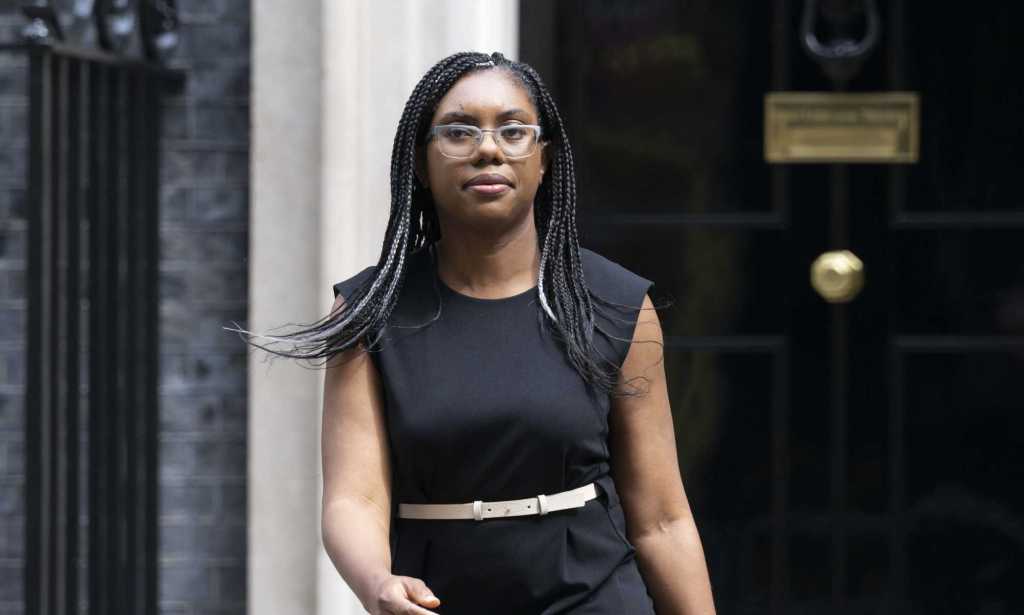6 times Kemi Badenoch showed she’s no LGBTQ ally
Kemi Badenoch may have been minister for women and equalities, but the new Conservative Party leader hopeful did nothing to advance the rights of lesbian, gay, bisexual or trans people during her time in government – in fact, many of her actions have made life worse for vulnerable minorities.
Whether it’s blocking conversion therapy legislation or spouting damaging misinformation about trans identities, Badenoch positioned herself as one of the UK government’s most vocal opponents to LGBTQ+ rights.
Over the past few years, Kemi Badenoch ascended through the ranks of the Conservative Party from relatively quiet junior minister to one of the most prominent anti-trans voices in the UK government. She has made it abundantly clear on a number of occasions what her views are on LGBTQ+ issues – particularly trans rights – but comments she made in parliament leave no room for doubt on her position.
As Kemi Badenoch, takes over from Rishi Sunak as leader of the opposition, we take a look back at six times she has proven unequivocally that she is an enemy of progress and LGBTQ+ rights.
Kemi Badenoch met with the LGB Alliance

One of the first major signs that Kemi Badenoch was not an ally to the LGBTQ+ community came when it emerged she had secretly met with anti-trans campaign group LGB Alliance.
Badenoch had an “introductory meeting” with the organisation on 13 July 2020, openDemocracy revealed.
While the LGB Alliance denies it is transphobic, the group – which was granted charitable status in 2021 – has been repeatedly condemned as a “hate group” by numerous commentators and LGBTQ+ advocacy groups, including Pride in London and Guardian columnist Owen Jones.
At the time, a government spokesperson defended Badenoch’s decision to meet with the LGB Alliance, saying it was “entirely appropriate” and that “views from all sides of the debate were heard”.
She described trans women as ‘men’ in a leaked recording

Perhaps one of Kemi Badenoch’s most damning moments came when she mocked trans women in a leaked recording, describing them as “men”.
The recording, obtained and released by Vice, was created in Badenoch’s parliamentary office in 2018, just one year after she was elected as MP for Saffron Walden.
In the recording, Badenoch could be heard saying: “It’s no longer about minority rights in terms of race any more or nationality, it’s now, you know like, it’s not even about sexuality now, it’s now like the whole transgender movement, where, OK well we’ve got gay marriage, and civil partnerships, so what are transexuals looking for?”
She continued: “Even when, you know, so, people hear about, you know like the whole bathroom thing, it’s actually more of an American thing but they have a similar problem, that, right so now it’s not just about being free to marry who you want, you now want to have men using women’s bathrooms.”
In particular, Badenoch faced significant criticism for her line about “men using women’s bathroom. At the time, a spokesperson said she was “working hard to deliver for LGBT people” and insisted that her 2018 comments had been “taken out of context”.
Kemi Badenoch worked to quash trans-inclusive workplace policies

In 2022, during Kemi Badenoch’s failed Tory leadership bid, Vice also revealed that she had pressured the Financial Conduct Authority (FCA) to drop trans-inclusive workplace policies during her time as a junior equalities minister.
The proposed policies would have allowed trans staff to self-identify their gender for the purposes of reporting on workplace diversity, which would have meant that trans women could be included in figures on the number of women working in finance.
However, the FCA faced strident backlash from anti-trans campaigners when the proposed policy was publicised – and it later emerged that Badenoch was among those who pushed for the plan to be put to bed.
In November 2021, Badenoch wrote to the FCA: “The ‘sex’ of an individual is an important protected characteristic. It would be helpful to understand what measures are in place to ensure that your approach does not undermine your efforts to measure and improve the representation of the female sex in company boards.”
She failed to ban conversion therapy

During Kemi Badenoch’s time as a junior equalities minister, it became increasingly clear that she and her fellow government ministers were not in favour of banning conversion therapy.
The conversion therapy saga became one of the Conservative government’s biggest LGBTQ+ failings. Theresa May first announced plans to outlaw the practice in 2018, but legislation has since been repeatedly delayed, with the Tories’ revolving door of prime ministers regularly changing their minds on whether it should be outlawed in the first place.
In October 2022, shortly after she was promoted to women and equalities minister by Rishi Sunak, it emerged that Badenoch had decided to stall on a conversion therapy ban even further because she wanted to “scrutinise” proposals.
Very little happened after that, other than more flip-flopping from Badenoch and her party colleagues on the issue.
But Badenoch made her thoughts on conversion therapy crystal clear when she stood up in parliament on Wednesday (6 December) and repeated a conspiracy theory pushed by anti-trans campaign groups that gender-affirming care is “a new form of conversion therapy”.
Badenoch spoke about Keira Bell, a detransitioner who received gender-affirming care from the age of 16 and later had top surgery as an adult. Referencing that case, Badenoch said doctors were “fearful of giving honest clinical advice to a child because if they do not automatically affirm and medicalise a child’s new gender they will be labelled transphobic”.
It was a striking moment that left LGBTQ+ people in the UK with little doubt about the people Badenoch is listening to on the issue of conversion therapy.
Kemi Badenoch wants to restrict gender recognition for those who move to the UK

Kemi Badenoch’s latest move was to announce an updated “list” of countries that are deemed to have gender recognition laws that are as “rigorous” as that of the UK.
By “rigorous”, what Badenoch apparently means is “unnecessarily difficult”. The UK’s gender recognition laws are infamously outdated – it’s an overly bureaucratic, medicalised system, which is why Theresa May’s government pledged to introduce self-identification before she was ousted as prime minister.
Badenoch apparently wants to make sure that people who move to the UK can’t automatically have their gender correctly recognised if they benefited from self-ID in a more progressive country, which is where her updated list comes in.
Speaking in parliament in December 2023, Badenoch said her approved list of countries with acceptable gender recognition laws was “long overdue”. The government had a blacklist made up of 50 countries where trans people are allowed to transition “too easily”.
Countries the Conservative government decided had equally “rigorous” gender recognition laws include nations where trans people are sterilised, where they are required to undergo invasive surgeries, and even some where familial permission is required before a person is allowed to legally change their gender.
She took aim at equality initiatives

In May 2024, Kemi Badenoch made her views on diversity, equality and inclusion (DEI) initiatives within businesses very clear.
Badenoch, who also serves as business secretary as well as the minister for equalities and women, said there is a “creeping – and counter-productive – politicisation” of business, and that DEI initiatives, which often benefit LGBTQ+ employees, “divide, rather than unify.”
The politician’s comments came in the wake of a report from the right-wing think tank Policy Exchange, which suggested that the British public think businesses are too concerned about political activism.
It’s an alarming list, but it represents everything Badenoch and her government stands for when it comes to LGBTQ+ issues. The Tories have made it abundantly clear that they are primarily interested in fanning the flames of culture wars and rolling back the rights of a vulnerable minority group who urgently need protection.
A time of progress on LGBTQ+ rights in the UK now feels like a distant memory.







